Note: This novel was SHORTLISTED for both the Booker Prize and the Whitbread Prize in 2001.
“…The day-to-day business of dying ran on relentlessly, a ferocious, semi-public labour. What sense did it have beyond the workings of a certain crude biology? What good lesson could be learned from watching someone die? Was it just to throw you back harder against your own life, to make you see the necessity of getting on with it…a glib reminder that ‘soon you shall be as I am’?”
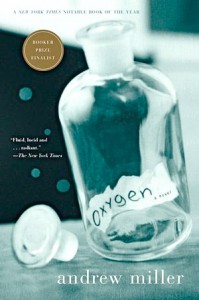 Revealing the final days of Alice Valentine, a former headmistress who is being attended by her sons and closest friends, Andrew Miller’s thoughtful novel Oxygen remains remarkably hopeful, never descending into the bathos of so many other end-of-life novels. Alice’s dying, though realistically described, becomes, in fact, the fulcrum upon which the novel studies three other characters as they gain new insights into their own lives. All of them have some “unfinished business” with which they have not come to terms, and as these characters focus their attention on Alice, while reminiscing privately about their own pasts, the novel goes far beyond the customary focus on the meaning of life and death to include each character’s secret failures, the guilt accompanying these, the nature of true happiness, and what it requires to become a “successful” human being. Ultimately, Miller’s characters ask “Who are we?” As Alice herself muses, “Was the ‘she’ who thought all [these things] just a brain that would die when the last of the oxygen was used up? Surely there was something inside, some inward shadow, the part that loved Mozart [perhaps].”
Revealing the final days of Alice Valentine, a former headmistress who is being attended by her sons and closest friends, Andrew Miller’s thoughtful novel Oxygen remains remarkably hopeful, never descending into the bathos of so many other end-of-life novels. Alice’s dying, though realistically described, becomes, in fact, the fulcrum upon which the novel studies three other characters as they gain new insights into their own lives. All of them have some “unfinished business” with which they have not come to terms, and as these characters focus their attention on Alice, while reminiscing privately about their own pasts, the novel goes far beyond the customary focus on the meaning of life and death to include each character’s secret failures, the guilt accompanying these, the nature of true happiness, and what it requires to become a “successful” human being. Ultimately, Miller’s characters ask “Who are we?” As Alice herself muses, “Was the ‘she’ who thought all [these things] just a brain that would die when the last of the oxygen was used up? Surely there was something inside, some inward shadow, the part that loved Mozart [perhaps].”
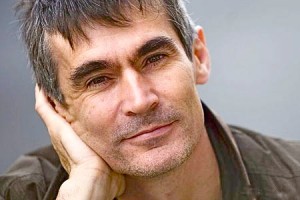 Alice’s elder son Larry, a handsome, well-built, former 1980 French Open tennis champion now living in the US, has starred in a TV series, now canceled. His alcohol and cocaine consumption have jumped, leaving him in financial straits, and his marriage is in trouble. By keeping his California life secret from Alice, Larry remains the apple of her eye. The least sensitive among the people at Brooklands, Larry wants to tell his mother that her vision of him is false – and the fact that he has sunk to a new low with his latest film project weighs heavily upon him. He is “agitated by a great backlog of thinking. He could not decide whether there were a great many decisions to be made, or none at all; whether his situation warranted some explosion of energy, some drama of action, or if he should simply wait and see; if indeed there was nothing he could do that would make the slightest difference.”
Alice’s elder son Larry, a handsome, well-built, former 1980 French Open tennis champion now living in the US, has starred in a TV series, now canceled. His alcohol and cocaine consumption have jumped, leaving him in financial straits, and his marriage is in trouble. By keeping his California life secret from Alice, Larry remains the apple of her eye. The least sensitive among the people at Brooklands, Larry wants to tell his mother that her vision of him is false – and the fact that he has sunk to a new low with his latest film project weighs heavily upon him. He is “agitated by a great backlog of thinking. He could not decide whether there were a great many decisions to be made, or none at all; whether his situation warranted some explosion of energy, some drama of action, or if he should simply wait and see; if indeed there was nothing he could do that would make the slightest difference.”
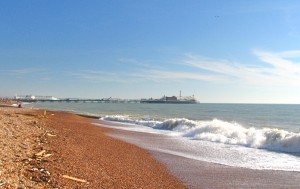
Brighton Beach, where Alex was once found wandering
Younger son Alec, a thin aesthete, works as a translator for Laszlo Lazar, a Hungarian playwright living in Paris who is working on a new play. At some point in the past, Alec has had a mini-breakdown, during which he was found wandering along Brighton Beach. Despite his own problems and the pressure of his work, he has been attending his mother, though hard pressed to control his resentment of his favored older brother who has been unavailable for most of the emergencies involving her. Still desperate for Alice’s praise, Alec has his mother’s best interests at heart, but he is squeamish about illness and the details of dying, and is guilt-ridden because he cannot make himself attend to all her physical needs. “Though he had visions of [hugging her], making some show of his own pain, he did nothing, for fear that whatever he could say or show would be grossly inadequate. For fear, too, perhaps, of what might happen if he did manage to express what he felt.”
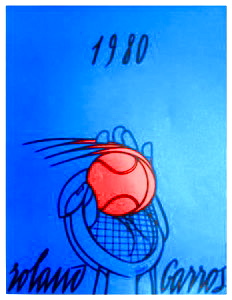
Poster for the 1980 French Open at Roland Garros Stade
Laszlo Lazar, a Hungarian playwright living in Paris, fought during the Hungarian Freedom uprising and was the only one of his brigade to survive, but he feels guilty about a close friend whose death he blames on himself. He tries to avoid looking back: “How could he look back when there was only shame to look back on? What pride could he take in consummate failure?…He wanted to forget forever.” Though he has no direct connection with Alice, he is dependent upon Alec for his play, and Alec is not in London working. The play, called Oxygene in French, provides a dominating image for the novel. Requiring two sets, it is the story of a mining disaster in Eastern Europe, with action occurring both above the ground and beneath the ground. As the oxygen in the mine runs out, the behavior of the desperate rescuers and the desperate miners becomes more frantic, with the play’s ending showing many parallels to what is happening at Alice’s bedside and within the psyches of Laszlo, Larry, and Alec.
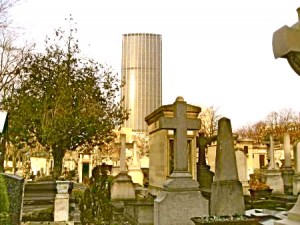
Montparnasse Cemetery, visible from Laszlo Lazar’s apartment
As the action rotates among these characters, their interactions with each other reveal them beginning, individually, to look for ways to atone for their past failures, if atonement is necessary, and as Alice’s health begins to fail dramatically, their responses show them beginning to find new ways of behaving. The reader sees clearly how they all ache to be connected to a positive force which will give meaning to their lives (and, perhaps, end their nagging guilt about their failures), just as Alice improves when she is connected to oxygen. Laszlo’s chance to atone for the past is particularly dramatic, and Alec’s is life-changing.

Institut du Monde Arabe in Paris
Despite its complex, seemingly depressing subject, the novel is actually thrilling to read, in part because of Andrew Miller’s skill as a novelist. One of the clearest, cleanest writers in the world today, Miller chooses exactly the right word to meld perfect images with universal themes in new ways. His characters feel real, and their behavior and internal crises feel “normal.” (After all, who among us does not have regrets about certain aspects of our lives, or decisions we have made which we now regret, or opportunities we have squandered?) Perhaps it is this reason that the book speeds along, despite its heavy subject matter. Every detail is necessary to the overall story, and every detail works. An elegant novel told simply.
Note: Miller’s debut novel, Ingenious Pain, won the prestigious IMPAC Dublin Award and the James Tait Black Memorial Prize, and Oxygen was shortlisted for both the Booker Prize and the Whitbread Award. Pure won both the Costa Best Novel Award (formerly Whitbread Award) and the Costa Book of the Year Award in 2012.
ALSO by Miller (in addition to those in the Note above): THE CROSSING.
Photos, in order: The author’s photo by Gretel Insignia appears on http://www.metro.co.uk
Brighton Beach, where Alex was found wandering, at one point, is shown here: http://www.earth-photography.com
The poster for the 1980 French Open at Roland Garros Stade, is seen on http://en.wikipedia.org The tournament that year was actually won by Bjorn Borg.
Laszlo Lazar lives in Paris in an apartment building overlooking Montparnasse Cemetery, where Jean-Paul Sartre, Simone deBeauvoir, and Samuel Beckett are buried. http://www.momondo.com
Laszlo meets someone who may help him change his life at Institut du Monde Arabe in Paris, shown here. http://arquitectura.mapolismagazin.com
